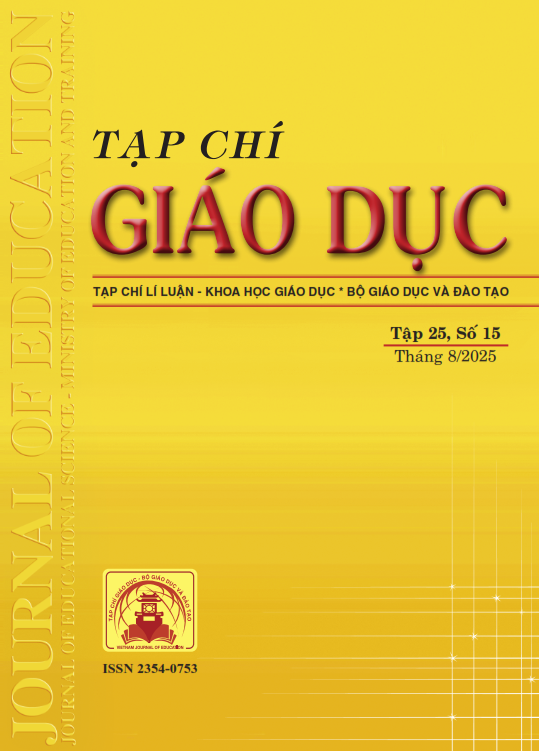Tác động của phương pháp học tập dựa trên vấn đề trong nâng cao hiệu suất học tập cho sinh viên ngành Du lịch: Nghiên cứu tại một số trường đại học khu vực Đông Nam Bộ
Tóm tắt
In the context of higher education increasingly focusing on innovation in teaching methods, Project-Based Learning (PBL) is considered an effective method to help students develop problem-solving skills and apply knowledge into practice, especially in highly practical majors such as Tourism. This paper aims to explore the impact of Project-Based Learning (PBL) on the learning performance of Tourism undergraduates at universities in Southeast Vietnam. Data collected from 425 valid survey questionnaires were analyzed using partial least squares structural equation modeling (PLS-SEM). The results show that PBL has a positive impact on learning performance and support from lecturers. The study also found that instructor support plays a mediating role between PBL and learning performance, confirming that positive interactions between instructors and students are important factors in the learning process. These findings not only provide evidence for the research hypotheses but also provide recommendations for improving the quality of training in the context of higher education.
Tài liệu tham khảo
Barrows, H. S. (1996). Problem‐based learning in medicine and beyond: A brief overview. New Directions for Teaching and Learning, 1996(68), 3-12. https://doi.org/10.1002/tl.37219966804 Đặng Thị Dạ Thủy, Nguyễn Thị Diệu Phương, Lê Thị Ngọc (2023). Quy trình xây dựng vấn đề thực tiễn và tổ chức học tập dựa trên vấn đề trong dạy học phần Sinh học tế bào, Sinh học 10. Tạp chí Khoa học, Đại học Huế, 132(6A), 69-88. Falaleeva, M. V., & Kosheleva, E. Yu. (2011). Problem-based learning instructions: How to activate students' motivation in learning English. Philological Sciences: Issues of Theory and Practice, 2, 10-12. Fornell, C., & Larcker, D. F. (1981). Evaluating structural equation models with unobservable variables and measurement error. Journal of Marketing Research, 18(1), 39-50. https://doi.org/10.1177/002224378101800104 González, A., Rivas, J., & Gómez, M. (2019). The role of teaching support in students' academic performance: A systematic review. Educational Psychology Review, 31(3), 435-459. https://doi.org/10.1007/s10648-019-09462-5 Hair, J. F., Risher, J. J., Sarstedt, M., & Ringle, C. M. (2019). When to use and how to report the results of PLS-SEM. European Business Review, 31(1), 2-24. https://doi.org/10.1108/EBR-11-2018-0203 Hattie, J. (2009). Visible learning: A synthesis of over 800 meta-analyses relating to achievement. Routledge. Henseler, J., Ringle, C. M., & Sarstedt, M. (2015). A new criterion for assessing discriminant validity in variance-based structural equation modeling. Journal of the Academy of Marketing Science, 43, 115-135. Hmelo-Silver, C. E. (2004). Problem-based learning: What and how do students learn?. Educational Psychology Review, 16(3), 235-266. https://doi.org/10.1023/B:EDPR.0000034022.16470.f3 Hoàng Thị Hồng, Lê Huy Tùng (2016). Vận dụng dạy học dựa trên vấn đề trong giảng dạy môn học Kĩ thuật điện. Tạp chí Khoa học, Đại học Quốc gia Hà Nội, 32(2), 9-14. Kock, N. (2015). Common method bias in PLS-SEM: A full collinearity assessment approach. International Journal of e-Collaboration, 11(4), 1-10. Nguyễn Thanh Nga (2020). Dạy học tích hợp - Phát triển năng lực giải quyết vấn đề thực tiễn cho học sinh trung học. NXB Đại học Sư phạm Thành phố Hồ Chí Minh. Rösner, A., Halkier, H., & Mair, M. (2016). Problem-Based Tourism Learning: Principles, applications, experiences. Aalborg University. Savery, J. R. (2015). Overview of problem-based learning: Definitions and distinctions. Essential readings in problem-based learning: Exploring and extending the legacy of Howard S. Barrows, 9(2), 5-15. Topping, K. J. (2005). Trends in peer learning. Educational Psychology, 25(6), 631-645. https://doi.org/10.1080/ 01443410500345172 Wang, L., Liu, Y., & Zhang, Y. (2017). The impact of teacher support on student engagement and academic achievement: A multi-level analysis. Educational Research and Evaluation, 23(3-4), 166-192. https://doi.org/ 10.1080/13803611.2017.1352137
Tải xuống
Đã Xuất bản
Cách trích dẫn
Số
Chuyên mục
Giấy phép

Tác phẩm này được cấp phép theo Ghi nhận tác giả của Creative Commons Giấy phép quốc tế 4.0 .












